Will Gaza Disrupt Western Elections?
Does the sound and fury over the Gaza Conflict make a difference? It's time to take The Sniff Test.
Why am I reading this now?
The New York Times claims Google removed upvotes from its internal message board because of vicious infighting over Israel and Palestine.
As with any story, it’s important to ask “Why am I reading this now?”. Pirate Wires claims the company acted because of support for posts critical of CEO Sundar Pichai. The Gaza Conflict is a smokescreen but also a symptom of polarised opinion.
I am not offering a view on right and wrong in the Middle East. Opinions are entrenched and I won’t change anyone’s mind.
Instead I’ll consider whether entrenched opinions play a part in upcoming US and UK elections. Or are they all sound and fury?
A Generational Divide
If you read or watch mainstream media you’ll be forgiven for thinking there is a rising tide of opposition to Israel that will force western governments to change direction. College campuses are aflame and tech giants like Google are paralysed by politicised workers at each others’ throats.
The Presidents of Harvard and the University of Pennsylvania have lost their jobs over an inability to manage the fallout. Israel is by far the largest cumulative recipient of US economic and military aid. Is an era about to end?
The Pew Research Center provides a comprehensive analysis of US opinion, from a survey conducted in February. More Americans sympathise with Israel.
Around a quarter of people have no view. Either it’s too complicated or too far away to bother. My suspicion is the latter. Another quarter are generally sympathetic. No votes there.
Just over 30% of people favour Israel and this is twice as many as favour the Palestinian people. Given this result, why is Biden upping the pressure on Israel over its conduct of the conflict?
The first rule of campaigning is shore up your base. Elections aren’t won by changing people’s minds but by increasing turnout. Get your wavering supporters to the ballot, especially in places where the result is in the balance. The 66% turnout in 2020 was the highest since 1900.
40% of young people don’t have a view on the conflict and are likely to be non-voters. 18-29 year olds are the lowest voting age cohort. The political prize is the opinionated young voter, who skews more than three to one to the view that the US is too pro Israel.
The older you are the more likely you favour Israel. Knowledge of the Holocaust might be one reason. An Economist/YouGov survey found that one fifth of US citizens aged 18-29 believe it is a myth and 30% didn’t know. 0% of those aged over 65 hold this view.
Political and Religious Divisions
Across the age ranges, Democrats are ten percentage points more likely to have an opinion than Republicans. When they do they support the Palestinians. One third consider Biden to be too pro Israel, while a similar percentage of Republicans believe him too pro Palestinian.
Among Muslims, 60% believe Biden is too pro Israel. A higher percentage of Jewish respondents have a view, but almost half say the policy is about right. 13% think Biden is too pro Israel. As a larger and more established community, the Jewish response better reflects the population at large.
It is evangelical white Christians who are most supportive of Israel. The religiously unaffiliated are five times as likely to consider Biden to be against Palestine. Again this reflects party politics, with a religious right against an agnostic left.
Whether Gaza is a divisive issue, or people take sides because of existing affiliations, is hard to tell. In a polarised society certain views are required to identify with your tribe. Muslim respondents are more tribal than Jewish, but that may be because the US is supportive of Israel in the first place. White Christians draw on biblical reasons to back Israel.
The divided opinion of Democrats and Republicans matters for the election. Biden is behind in the polls in five of the seven swing states where the election is expected to be decided. The other two are neck and neck. The one in the news is Michigan.
Here a vocal Arab-American minority says it will abstain. 1.6% of the state’s population is Arab-American, which is three times the national average, but small. Yet in close elections marginal votes are all that matter.
A read of the nationwide polls might favour business as usual. But the details from Pew indicate an incentive for Biden to shift support away from Israel to energise his base.
The Atlantic Divide
More than two-thirds of Americans share my view that a lasting resolution in the Middle East is unlikely.
This is at odds the view in the UK. Although the polls ask different questions, both were taken in February. A YouGov poll shows a rising percentage of the UK population believes a permanent peace is possible. One third of respondents feel this way compared to no more than 10% in the US.
In January, Foreign Secretary David Cameron suggested the UK is moving closer to recognising a Palestinian state and that any agreement had to show “irreversible progress” in this direction.
A two thirds majority of the UK population supports a two state solution to the conflict. A similar percentage oppose things remaining as they are, or solutions where one side expels the other.
The greater optimism about the possibility of a resolution and the likelihood of a two state solution reflects the UK’s lesser role in the region. Israel is protected by US technology under the Iron Dome and the US supplies more than two thirds of its arms imports. Germany supplies another 30%, rendering the weapons embargoes by Canada, the Netherlands, Belgium, Spain, Japan and Australia irrelevant.
Without a disproportionate financial commitment, it is easier for UK politicians to take the high ground without worrying too much about practicalities. The UK population seems happy with this stance.
Pro-Palestinian Opinion
In the UK, nearly twice as many people believe Israel’s attack on Gaza is unjustified versus justified. This is another significant departure from US popular opinion. The share who back Israel is falling, along with those thinking military action should continue without negotiation.
While YouGov uses different age brackets, the generational divide is similar to the US. While only 9% of those aged 18-24 sympathise more with Israel, 29% of those over 65 do. This oldest cohort is the only one to sympathise more with Israel than Palestine.
Support for Palestinians is highest in Scotland, while the Welsh are most equivocal. Support in England is evenly spread with the exception of London. Capital dwellers are more likely to have an opinion and 41% favour Palestinians. Israeli support is the same here as it is throughout the nation, at 16%.
In the 2021 census, 15% of London’s population identified as Muslim. This is more than twice the 6.5% average for England and Wales. Across the two nations only 0.5% of people identify as Jewish.
The UK is markedly more Muslim than the US. 1.1% of Americans are Muslim and 2.4% Jewish. For all the campus heat, the Gaza Conflict is a potentially hotter political issue in the UK. That does not make it a bigger electoral issue, however.
For one thing, the result of the next UK election is more of a foregone conclusion than the US Presidential poll. Changes to UK policy are unlikely to have a bearing on the outcome and the UK’s aspirational line is easier to hold.
Neither is Gaza an especially contentious issue in the UK. The balance of the population with an opinion wants peace while sympathising with the Palestinians. The media both reflects and shapes this view.
In theory, a despairing Conservative government could toughen its stance on Israel to capture votes. In practice, this would not work because the pro-Palestinian constituencies are strongly Labour supporting. Almost half of Labour voters sympathise with the Palestinians compared to 10% of Conservatives.
Michigan and New York
A shift in stance for electoral reasons seems possible in the US. That does not make it likely. A Statista survey with YouGov from February revealed inflation, healthcare, immigration, and jobs & the economy to be the biggest electoral issues. Together they account for two thirds of the electorate’s choice of most pressing issue.
Climate and the environment gathered 8% of responses, twice as many as guns, which in turn was double civil rights. Abortion captivates 5% of voters.
A majority of the electorate care about the economy and their health. This changes little from election to election, making for dull media copy. The issues that grab the headlines and are reported on overseas, are not especially relevant. They provide fodder for candidates to hurl at each other, but that changes little and favours those ahead in the polls.
Right now that is Trump because not enough people feel well enough off. With low unemployment, record stock markets and inflation declining, this baffles both the Democratic leadership and the media. Yet little can be done about the economy at short notice. Hence the focus on marginal issues to try and tweak the polls.
Middle East policy is a peripheral issue, despite attempts this week by PBS to claim it is mainstream. A pivot towards Palestine would appeal to the Democratic base but not much more. Michigan will have to be devilishly close for deliberate abstentions to make a difference. Plus a pivot carries its own risks.
11% of New York state is Jewish and 16% of New York City. While polls show that Jewish people are not radicalised by the Gaza Conflict, they might be if a two state solution comes closer. New York is staunchly Democrat and carries 28 electoral college votes to Michigan’s 15.
Israel’s Ticking Time Bomb
The left-leaning support for Palestinians is a long-term winning policy. The Pew Research Center forecasts that the world’s Muslim population will grow by 70% between 2015 and 2060. Overall population growth is expected to be 32%.
In the second half of this century, Muslims will surpass Christians to become the single largest global religious group. They will number nearly three billion by 2060 and be over 30% of the global population.
The primary reason for this is birth rate. In every region of the world bar Latin America, Muslims have more children. Muslims have an average age of 24, seven years younger than everyone else.
The Muslim population of Europe is estimated to rise to over 75 million in 2050 according to Statista. The non-Muslim population will decline by 50 million in that time, to 445 million if there is no immigration. It seems inevitable that political opinion will shift away from Israel as a consequence.
The trend for younger voters to favour Palestinians in the US and Europe will not have escaped Israel. Neither will the shifting demographics, especially in Europe. Political support is on a downtrend.
Israel has a significant technological advantage in both military and non-military arenas. It has the upper hand in Gaza and the conflict is not enough of an electoral issue to cause a major shift in Western policy. Yet there is little that can be done about demographics.
Armed with this knowledge and current advantages, Israel may be pushing for a final resolution to the Palestinian question. The longer it is unresolved, the greater the likelihood that Israel loses.






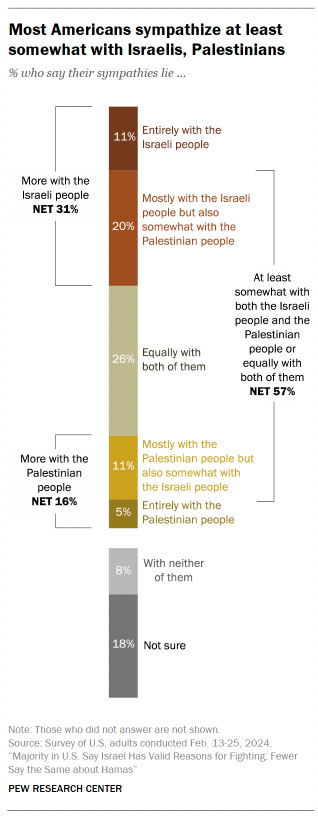
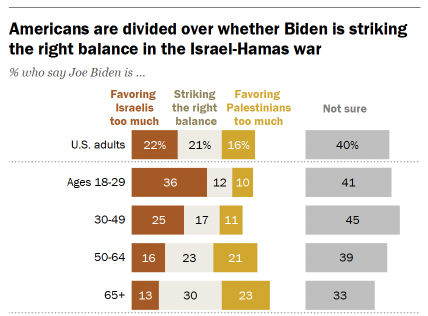

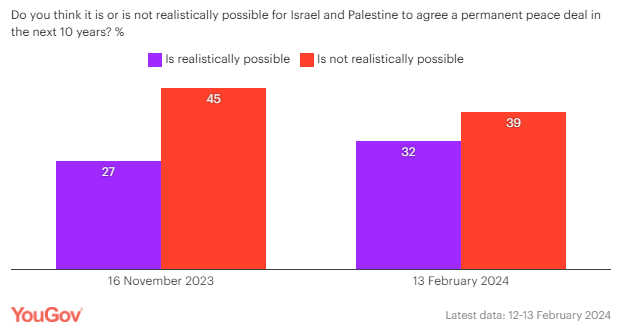
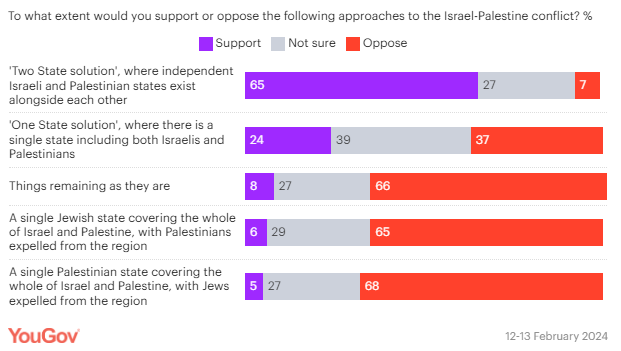

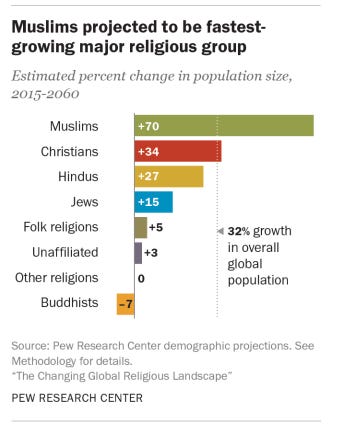
Excellent piece
The late Canadian Jewish author Saul Bellow once emphasised his fear of Israel becoming "a holocaust museum with an air force"
Splitting lands on religious grounds rarely works unless the objective is divide and rule as evidenced by the partition of Ireland and India, but Bellow's concerns I suspect were borne of precisely that especially lands which hadn't been considered anything other than Arab for a thousand years
I suspect the electorate would be largely indifferent to Gaza in isolation as a significant electoral issue But coming so soon alongside the increasing disaster for the West in Ukraine, where certainly Britain and the EU pledged eternal support for the Zelensky administration, its clear the US is probably looking at China for its primary focus in election year, whilst backing away from Ukraine and perhaps being less than supportive of a Netanyahu administration that seems to have botched the whole Gaza conflict from its start
Taking a panoramic geopolitical view thus, it seems especially the British are punching way above their sabre rattling weight, because as much as Tobias Ellwood and Boris Johnson talk the talk of all out war with Russia, the reality is they hopelessly underestimated Russian military capacity and are using diplomatic efforts to keep a reluctant US in the game
It also appears that they have underestimated the Middle East power game, in part because Saudi and Iran for now are singing from the same nasheed, possibly with backing from Beijing and this has made the US reluctant to strike directly at a powerful adversary, certainly more powerful than 20 years ago
So all combined, we have a big election year with the UK/EU desperately trying to keep Ukraine going, Israel being slowly isolated and an outgoing US administration focussing on China
That is why I suspect the incumbents are fearful of voter intentions given the exorbitant cost of these increasingly fruitless conflicts, spiralling taxation to pay for them and all this whilst the obsession with net zero drains the life out of Western economies